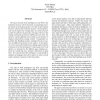Free Online Productivity Tools
i2Speak
i2Symbol
i2OCR
iTex2Img
iWeb2Print
iWeb2Shot
i2Type
iPdf2Split
iPdf2Merge
i2Bopomofo
i2Arabic
i2Style
i2Image
i2PDF
iLatex2Rtf
Sci2ools
101
Voted
WEBI
2005
Springer
2005
Springer
Page-reRank: Using Trusted Links to Re-Rank Authority
The basis of much of the intelligence on the Web is the hyperlink structure which represents an organising principle based on the human facility to be able to discriminate between relevant and irrelevant material. Second generation search engines like Google make use of this structure to infer the authority of particular web pages. However, the linking mechanism provided by HTML does not allow the author to express different types of links such as positive or negative endorsements of page content. Consequently, algorithms like PageRank produce rankings that do not capture the different intentions of web authors. In this paper, we review some of the initiatives for adding simple semantic extensions to the link mechanism. Using a large real world dataset, we demonstrate the different page rankings produced by considering extra semantic information in page links. We conclude that Web intelligence would benefit in adoption of languages that allow authors to easily encode simple semantic ...
Internet Technology | PageRank Produce Rankings | Particular Web Pages | Simple Semantic Extensions | WEBI 2005 |
Related Content
| Added | 28 Jun 2010 |
| Updated | 13 Apr 2012 |
| Type | Conference |
| Year | 2005 |
| Where | WEBI |
| Authors | Paolo Massa, Conor Hayes |
Comments (0)




